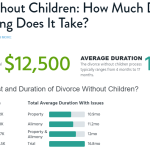Divorce can be an emotionally and financially draining experience. Therefore, it’s crucial that both partners involved understand the expectations and how California law applies in this process.
California is a community property state. This means that any assets and debts acquired during a marriage will generally be split equally between spouses, with certain exceptions applying.
No-fault divorce
California is a no-fault divorce state, meaning you don’t have to prove anything your partner did wrong in order to file for a divorce there. Instead, all that’s necessary is for either party to assert irreconcilable differences within their marriage and claim irreconcilability as grounds for filing for it.
However, when it comes to child custody and support decisions, courts consider various factors, including history of domestic violence between the parents as well as criminal convictions or other pertinent circumstances. Typically speaking, courts prefer shared legal and physical custody arrangements so both parents can participate in their children’s lives.
If you decide to file for no-fault divorce, the first step is submitting a Petition for Dissolution of Marriage with the court and serving your spouse with a Summons and Declaration of Disclosure (Form FL-140), which asks them both for information about their finances in order to establish support payments and property division.
Community property
California is one of nine community property states, meaning assets and debts acquired during a marriage or domestic partnership are considered community property and must be split equally between spouses. This includes earnings and possessions bought with those earnings such as cars, houses and furniture as well as financial obligations such as 401(k) plans, life insurance policies or businesses acquired during marriage; some assets do remain separate even though acquired during marriage such as those owned before marriage or by one partner at the start.
There are some exceptions to this rule, such as when separate property becomes part of community property – for instance when one spouse deposits money into a joint bank account in order to pay off a mortgage loan or receive it as an inheritance or gift from someone else. These situations often necessitate legal advice before taking action against one’s own assets.
Alimony
Alimony or spousal support refers to financial assistance provided from one spouse to the other during and/or after a divorce. It can either be permanent or temporary depending on the length of marriage and disparate earning potential between partners, and modified/terminated by court order based upon evidence that supports significant changes in income or living circumstances.
Alimony in California is designed to maintain the standard of living enjoyed during marriage for the supported spouse, such as housing expenses, food costs and clothing purchases. Furthermore, the court may take into consideration contributions to domestic duties or childrearing duties made by either partner in order to award alimony payments.
As part of property division in California, courts typically award both real estate and retirement accounts as assets to one partner in addition to alimony payments. Therefore, it is crucial that couples consult an attorney who understands this area well in order to make informed decisions regarding whether a full divorce or legal separation would best meet their needs.
Child custody
Child custody and visitation issues can be among the most complex aspects of any divorce proceeding. Parents often struggle to reach an agreement regarding these matters without court involvement, and these disputes can become emotional battlegrounds.
California courts prioritize a child’s best interests when making custody decisions, taking into account factors like their age, health, relationship with both parents, any history of domestic violence as well as how well parents collaborate on parenting decisions together. A judge will also look at whether parents can agree on parental decisions together.
CEB offers various resources that are up-to-date with California divorce laws for attorneys at law firms or independent practitioners, such as our comprehensive library of family law books written by legal experts that provide you with all of the information you need for successful practice.









